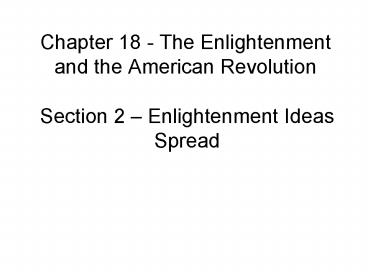Chapter 18 The Enlightenment and the American Revolution PowerPoint PPT Presentation
1 / 19
Title: Chapter 18 The Enlightenment and the American Revolution
1
Chapter 18 - The Enlightenment and the American
Revolution
- Section 2 Enlightenment Ideas Spread
2
- Setting the Scene
- Paris, the heart of the Enlightenment, drew many
intellectuals and others eager to debate the new
ideas. Reforms proposed one evening became the
talk of the town the next day. Even an enemy of
the Enlightenment admitted that "an opinion
launched in Paris was like a battering ram
launched by 30 million men - From France, Enlightenment ideas flowed across
Europe and beyond. Everywhere, thinkers examined
traditional beliefs and customs in the light of
reason and found them flawed. Even absolute
monarchs experimented with Enlightenment ideas,
although they drew back when changes threatened
the established way of doing things.
3
I. Censorship
- Government and church authorities waged a
censorship war against Enlightenment ideas,
banning/burning books and imprisoning writers
4
A. Censorship
- Philosophes and writers like Montesquieu and
Voltaire disguised their ideas in works of fiction
5
B. Salons
- Women began holding salons where philosophes,
middle-class citizens, and nobility could discuss
Enlightenment ideas
6
II. Enlightened Despots
- Enlightened despots (absolute rulers) used their
power to bring about political and social change
Catherine the Great of Russia
Frederick the Great of Prussia
7
A. Frederick the Great
- Frederick admired Voltaire and brought him to
Berlin to develop a Prussian academy of science
Frederick the Great and Voltaire
8
A. Frederick the Great
- He helped the peasants, tolerated religious
differences, and reformed the government to make
it more efficient
Voltaire with Frederick the Great
9
B. Catherine the Great
- Catherine II of Russia exchanged letters with the
philosophes and made limited reforms in law and
government
10
B. Catherine the Great
- Neither intended to give up any power
Catherine's major contribution to Russia was an
expanded empire
11
C. Joseph II
- The most radical of the enlightened despots was
the Hapsburg emperor Joseph II
Joseph II, 17411790, Holy Roman emperor
(176590), king of Bohemia and Hungary (178090),
son of Maria Theresa and Holy Roman Emperor
Francis I. Granted religious toleration, ended
censorship, and abolished serfdom
12
III. The Arts and Literature
- Art and architecture were either classical or a
grand and complex style called baroque
13
III. The Arts and Literature
- Architects and designers developed the rococo
style - personal, elegant, and charming
Madame de Pompadour portrait by François Boucher
circa 1750. Madame de Pompadour was a well known
courtesan and the famous mistress of King Louis
XV of France.
14
III. The Arts and Literature
- The growing middle class wanted their portraits
painted, but without the frills
Madame Jean Baptiste Nicolet Artist Jean
Baptiste Greuze late 1780s
Don Sebastien Martyez Artist Francisco de
Goya
15
III. The Arts and Literature
- New kinds of musical entertainment such as
ballets and operas appeared
Paris opera house
16
III. The Arts and Literature
- Bach created religious works for organs and
choirs Mozart created a new style of classical
composition
Johann Sebastian Bach 1685 - 1750
Wolfgang Amadeus Mozart 1756 1791
17
III. The Arts and Literature
George Frederick Handel wrote the Messiah, which
combines instruments and voices
Messiah
George Frideric Handel (1685-1759)
18
III. The Arts and Literature
- Literature developed new forms such as the novel
19
IV. Lives of the Majority
- Most Europeans were peasants in small rural
villages serfdom disappeared in the West but
expanded in Russia and the East

